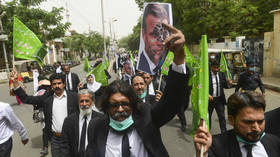The EU holding Pakistan’s trade hostage because of new blasphemy laws risks fueling Islamist extremism

Brussels’ threat to suspend trade privileges for Pakistan as the row over satirical cartoons of the Prophet Mohammed worsens may serve only to inflame tensions and damage the EU’s moral standing.
Meeting in a plenary session in Brussels, the European Parliament late last month adopted a resolution to consider revoking Pakistan’s trade privileges under the EU’s Generalized Scheme of Preferences+ (GSP+) due to its blasphemy laws.
The Pakistani laws, which punish blasphemous conduct against the Prophet Mohammed, have been labeled by MEPs as draconian measures that “incite harassment, violence and murder against those being accused” and “make it dangerous for religious minorities to express themselves freely or engage openly in religious activities.”
The motion also calls out the anti-blasphemy regulations for fomenting violent protests against French diplomats and private citizens in Pakistan. These have taken place in response to French President Emmanuel Macron’s defense of the satirical cartoons featuring the prophet published by the magazine Charlie Hebdo, which led to the murder of French schoolteacher Samuel Paty in 2020.
Noting that a spate of murders in Pakistan instigated by these laws has taken place over the past several years, the motion’s authors demand that the European Commission and the European External Action Service “review Pakistan’s eligibility for GSP+ status in the light of current events and whether there is sufficient reason to initiate a procedure for the temporary withdrawal of this status and the benefits that come with it.”
Also on rt.com Reckless posturing by the US over Russo-German Nord Stream 2 gas pipeline threatens erosion of trust between Washington and the EUThe EU’s GSP+ schemes allow a wide range of developing countries to benefit from zero- or low-tariff access to the EU market in certain classes of exports, conditioned on these countries signing and implementing various human-rights conventions. Pakistan has been a participant since 2014.
Disputing the claims in the resolution, Pakistani Foreign Office spokesperson Zahid Chaudhri said, “We are proud of our minorities, who enjoy equal rights and complete protection of fundamental freedoms as enshrined in the Constitution.” He went on to note that the two sides have ample room for bilateral discussions at the political level, including the Dialogue on Democracy, Rule of Law, Governance and Human Rights, and stated,“We would continue to remain positively engaged with the EU on all issues of mutual interest.”
Concern for the implications of these laws in Pakistani politics is valid – the victims of violence and intimidation are not only religious minorities, including Hindus, Christians, and Sikhs, but also Muslims who have spoken out against the laws. On April 20, in a move widely seen as a concession to Islamist extremists defending a tyrannical use of the blasphemy laws, a member of Pakistan’s ruling party launched discussions in the National Assembly on the potential expulsion of France’s ambassador.
But using trade as a foreign-policy tool may not be the best play for the EU in this situation. Its proposed suspension of Pakistan’s GSP+ privileges arguably violates international law. Resolution 3281 (XXIX) of the United Nations General Assembly, of December 12, 1974, and, in particular, Article 32 thereof, declares that “no State may use or encourage the use of economic, political or any other type of measures to coerce another State in order to obtain from it the subordination of the exercise of its sovereign rights.”
Also on rt.com For Riyadh, the prize in Yemen is oil – for Houthis the prize is YemenWeaponizing trade to solve sovereign political matters is a dangerous prospect for either side in this dispute. Pakistani Prime Minister Imran Khan is already feeling the heat from violent Islamist protests over Macron’s actions, and has also been trying to use the trade argument to resolve tensions.
Noting that Pakistan sends half of its sizeable textile exports to the EU, he warned that expelling the French ambassador would mean those exports “will end right there.” Attempting to channel popular anger, however, has led him to suggest a retaliatory measure that mirrors what the European Parliament is employing against Pakistan: “When 50 Muslim countries will unite and say this, and say that if something like [defending the publication of blasphemous cartoons] happens in any country, then we will launch a trade boycott on them and not buy their goods, that will have an effect.”
Yet cutting off trade links damages the international norm of mutual respect for each side’s sovereignty – the type of respect that fosters dialogue and dampens extremist views. The effect of any GSP+ cancellation or similar measure by Pakistan may simply be to harden views on the EU side that Pakistan is a serial human-rights offender and that trade should be used as a weapon. Pakistan refusing to buy from the EU, meanwhile, may rally even stronger support in Brussels for canceling the country’s GSP+ scheme. In reality, the economic gains from trade may be more conducive to political dialogue than a situation of reciprocal embargoes that isolates one country from the other.
Engaging effectively with a third country over its rule of law also requires sufficient moral standing, yet the EU is imperiling this standing by passing laws that potentially limit freedom of expression in its own territory.
Also on rt.com With child refugees disappearing by the thousands, the EU is again allowing a migration-related taboo explode into a crisisThe authors of the GSP+ resolution state that they are “extremely concerned at the increasing online and offline attacks on journalists, academics and civil society organisations, particularly those against women and minorities.” This statement is awkward in light of the fact that the EU legislative assembly has just rolled out a law to curtail “terrorist” content online, which many fear may lead to censoring freedom of expression.
The so-called TERREG regulation, adopted by the European Parliament in its recent plenary session, allows dangerous discretion to national authorities in one member state and even private organizations to request removal of allegedly terrorism-inciting content without judicial approval. It may not be exactly the same in content as a blasphemy law in Pakistan, but in potential effect, it could be broadly equivalent, threatening to stifle investigative journalism anywhere online in the EU, for instance, if one member state objected to it.
With both entities having instituted restrictive laws in their separate sovereign interests, the EU and Pakistan should focus on dialogue over correct interpretations of those laws so as not to violate civil liberties. Imposing trade restrictions over political matters may instead only undermine that type of dialogue and embolden extremist views.
The economic hardship caused by summarily shutting out half of Pakistan’s textile exports from the EU market could provide additional fuel for Pakistani Islamists preaching against Western hostility, just as a mass Muslim boycott of EU goods is the type of movement that could be captured by well-organized anti-government radical groups with large popular followings.
Like this story? Share it with a friend!
The statements, views and opinions expressed in this column are solely those of the author and do not necessarily represent those of RT.













